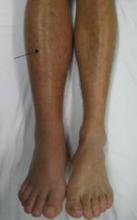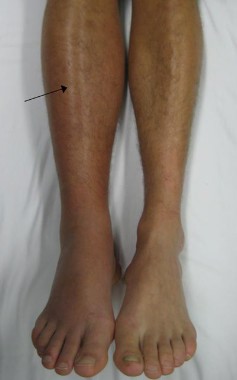User login
The oral anticoagulant apixaban has been approved for prophylaxis of deep vein thrombosis, which may lead to pulmonary embolism, in patients who have undergone hip or knee replacement surgery.
Approval was based on the results of three studies in more than 11,000 patients randomized to apixaban or enoxaparin, according to a March 14 statement issued by Bristol-Myers Squibb, which is developing and commercializing apixaban with Pfizer.
The studies, the ADVANCE-1, ADVANCE-2, and ADVANCE-3 studies, compared apixaban (2.5 mg twice a day starting after surgery) to enoxaparin (30 mg or 40 mg administered subcutaneously once a day starting before surgery) in 11,569 patients undergoing hip or knee replacement surgery.
Apixaban, marketed as Eliquis, is a selective Factor Xa inhibitor, approved in 2012 for reducing the risk of stroke and systemic embolism in patients with nonvalvular atrial fibrillation, at a recommended dose of 5 mg twice a day. The recommended dose for the new indication is 2.5 mg twice a day.
The apixaban prescribing information includes a boxed warning about the increased risk of spinal or epidural hematoma, "which may cause long-term or permanent paralysis" in patients treated with apixaban who are undergoing spinal epidural anesthesia or spinal puncture.
An application for approval of apixaban for the treatment of deep vein thrombosis and pulmonary embolism, and for the reduction in the risk of recurrent DVT and PE, is currently being reviewed at the Food and Drug Administration, according to BMS.
The oral anticoagulant apixaban has been approved for prophylaxis of deep vein thrombosis, which may lead to pulmonary embolism, in patients who have undergone hip or knee replacement surgery.
Approval was based on the results of three studies in more than 11,000 patients randomized to apixaban or enoxaparin, according to a March 14 statement issued by Bristol-Myers Squibb, which is developing and commercializing apixaban with Pfizer.
The studies, the ADVANCE-1, ADVANCE-2, and ADVANCE-3 studies, compared apixaban (2.5 mg twice a day starting after surgery) to enoxaparin (30 mg or 40 mg administered subcutaneously once a day starting before surgery) in 11,569 patients undergoing hip or knee replacement surgery.
Apixaban, marketed as Eliquis, is a selective Factor Xa inhibitor, approved in 2012 for reducing the risk of stroke and systemic embolism in patients with nonvalvular atrial fibrillation, at a recommended dose of 5 mg twice a day. The recommended dose for the new indication is 2.5 mg twice a day.
The apixaban prescribing information includes a boxed warning about the increased risk of spinal or epidural hematoma, "which may cause long-term or permanent paralysis" in patients treated with apixaban who are undergoing spinal epidural anesthesia or spinal puncture.
An application for approval of apixaban for the treatment of deep vein thrombosis and pulmonary embolism, and for the reduction in the risk of recurrent DVT and PE, is currently being reviewed at the Food and Drug Administration, according to BMS.
The oral anticoagulant apixaban has been approved for prophylaxis of deep vein thrombosis, which may lead to pulmonary embolism, in patients who have undergone hip or knee replacement surgery.
Approval was based on the results of three studies in more than 11,000 patients randomized to apixaban or enoxaparin, according to a March 14 statement issued by Bristol-Myers Squibb, which is developing and commercializing apixaban with Pfizer.
The studies, the ADVANCE-1, ADVANCE-2, and ADVANCE-3 studies, compared apixaban (2.5 mg twice a day starting after surgery) to enoxaparin (30 mg or 40 mg administered subcutaneously once a day starting before surgery) in 11,569 patients undergoing hip or knee replacement surgery.
Apixaban, marketed as Eliquis, is a selective Factor Xa inhibitor, approved in 2012 for reducing the risk of stroke and systemic embolism in patients with nonvalvular atrial fibrillation, at a recommended dose of 5 mg twice a day. The recommended dose for the new indication is 2.5 mg twice a day.
The apixaban prescribing information includes a boxed warning about the increased risk of spinal or epidural hematoma, "which may cause long-term or permanent paralysis" in patients treated with apixaban who are undergoing spinal epidural anesthesia or spinal puncture.
An application for approval of apixaban for the treatment of deep vein thrombosis and pulmonary embolism, and for the reduction in the risk of recurrent DVT and PE, is currently being reviewed at the Food and Drug Administration, according to BMS.

